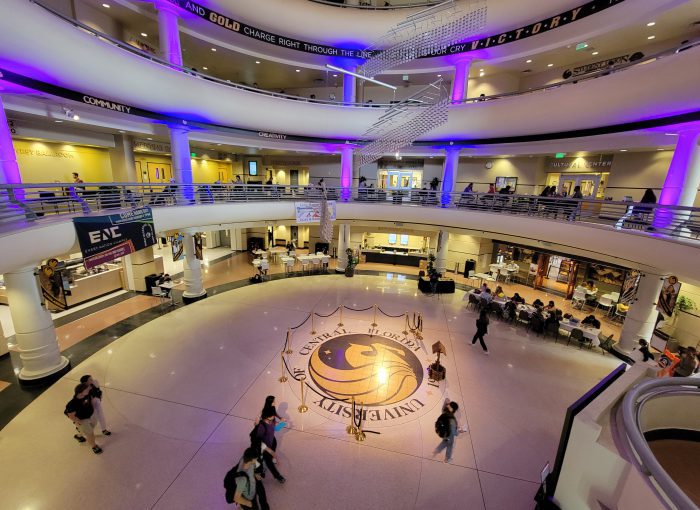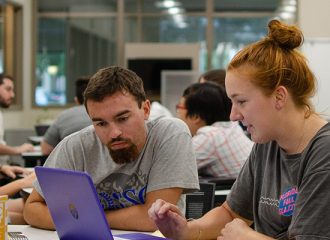By Mekenzie McElroy
In my three years at UCF, I’ve grown quite familiar with the “Change Major: Request” option on myUCF. When I was a freshman, I was scared of changing my major, because I thought I had to stick with the decision I made prior to entering college. However, my experiences in Writing and Rhetoric classrooms have pushed me to become more involved in the program, going from declaring the certificate to the minor to the major.
I started at UCF as a Biomedical Sciences major, which I decided after completing a four-year biomedical sciences program in high school. I’ve loved math and science since I was a kid, so it was the most obvious choice. I quickly learned that the easiest choice isn’t always the right one.
I felt disconnected from my studies because I wasn’t sure of a career path, and I was lacking the community I had hoped college would give me.
During my first semester at UCF, I was enrolled in a psychology course to complete the general education requirement. From the first class, I was hooked. So much so that I took Statistical Methods in Psychology for fun the next semester just so I could get another look into the field. As I learned more about the field and the students in it, I realized changing my major would put me a step closer to finding my place at UCF. I had started to feel more of a community, because I finally had some interests that aligned with my peers, but it wasn’t enough for me. I was still searching for some way to get more involved on campus and in my studies.
My introduction to the world of Writing and Rhetoric started during that same semester. I visited the office hours of my former ENC 1102 professor, Meeghan Faulconer, to ask about a writing class because she was the only faculty member I knew in the department. While we spoke, she casually asked if I was interested in working at the University Writing Center (UWC) here at UCF. I had mentioned my interest in becoming more involved on campus and my love for writing, so it felt like the perfect opportunity for me. She’s recently mentioned that she doesn’t want to take credit for what I’ve done with my studies, but I do think she deserves some credit for giving me that initial push.
The following year, I continued my studies exclusively in psychology, outside of my work in the UWC. I was satisfied in my coursework, but I felt an itch to take another writing course after being surrounded by writing. I had only ever taken one writing class at UCF, so I felt like I needed another to solidify my position as a writing tutor. One advantage of my job is the direct connection I have to faculty that have a genuine interest in my academic career, including Professor Matt Bryan, the Assistant Director of the UWC. After expressing my desire to take another writing course, he agreed that the Writing and Rhetoric Foundations course he was teaching over the summer was a great place to start.
During that same conversation, Professor Bryan suggested considering either the Public and Professional Writing certificate or the Writing and Rhetoric minor. I had plenty of room for the handful of courses that would fulfill either of these in my plan of study and it would be something that could help me prepare for graduate school.
I considered it after looking at the catalogs for each, settling on the certificate first. Within a few weeks of adding that, I changed it to the Writing and Rhetoric minor.
What excited me the most about Writing and Rhetoric were the course opportunities. I planned to take courses in professional writing and editing and civic and community-based communication. These were areas that seemed to be an overlap of my interests and provided what I was missing from my coursework in psychology classes. With the Writing and Rhetoric courses, I have the ability to actually apply the concepts I learn about in real-world setting.
When the Fall 2021 semester started, I was already feeling more comfortable with my place at UCF with my minor.
I was on track to study things I had a genuine interest in. I was only enrolled in one Writing and Rhetoric course at the time, but I still felt excited to tell my friends and family that I had added the minor. I once again found my way to a conversation with Professor Bryan to look over what courses I needed to take in the spring to fulfill the requirements of my minor. He was more than happy to suggest a few courses with professors he thought I would like, one of which led me to my current position as a double major.
Despite my reputation as an overachiever, I hadn’t considered taking up a second major until I spoke to Dr. Stephanie K. Wheeler, the Undergraduate Program Director of Writing and Rhetoric. I’m currently enrolled in her Rhetorical Traditions course, and I stopped into her office hours to ask about a concept from class. During a lull in conversation, she asked why I was just a Writing and Rhetoric minor.
I explained my academic journey to her, and we discussed what double majoring could look like for me, especially in terms of my career goals. After speaking to her about what that would entail, I spent the next hour figuring out what it could look like for me. Five days later, I changed my minor to a second major.
These conversations with Professor Faulconer, Professor Bryan, and Dr. Wheeler showed me the possibility of finding my community in Writing and Rhetoric. Classes are smaller, so professors are able to get to know their students, unlike my experiences in psychology classes. Here, I’m able to talk to professors about something I’m considering, and they use their connections to help talk me through it.
Having these faculty connections and their support has made me feel welcomed in my decision to become more involved in the Department of Writing and Rhetoric.
My involvement in the Department of Writing and Rhetoric also provided an opportunity to present at Writing Fest UCF this past February. Earlier in the previous semester, a fellow UWC tutor asked if I was interested in joining a panel to present research we had completed during our time at the Writing Center. Initially, I agreed just because she asked, but as the event neared, I had found myself becoming more invested in writing and rhetoric, so I was more excited about the opportunity.
Participating in this event made me realize just how special the Department of Writing and Rhetoric truly is and how much it felt like the right place for me. Students are provided a place to present research they’ve completed in their courses to a wider audience and faculty members are in attendance to support them and help them realize their work truly matters beyond the grades they receive in the classroom. While I knew several of the professors present, there were others I had never met cheering on my panel in the Zoom chat. This event made me feel more supported than I ever have during my time at UCF and made me realize I had found what I had been searching for since I started college— a community.
Writing and Rhetoric being the perfect community for me has only been affirmed as time has passed. Opportunities to become more involved in the program have popped up, including attending Theory Lab and joining DWR Student Ambassadors. In Theory Lab, I’m able to talk about rhetoric with faculty and students that have a genuine interest in the field. We meet every week, which provides a stable community that I’m happy to have found. I always know that I can bring questions to the group without judgement, or I can just sit and observe the conversations that occur. There’s no pressure to speak, which was extremely comforting for me when I first joined.
Student Ambassadors is an organization that allows students in the program to be more involved in DWR. Here, I met others that are invested in the program and have ideas of how to improve its connection to students. The current group of ambassadors is comprised of students I’ve either met in a class or through my work at the Writing Center, but we’ve been given the opportunity to work more closely together outside of the classroom and form our own community.
It was a long process for me to find exactly where I fit in at UCF. I tried out different majors and different student groups until I found what felt right for me. Luckily, I had professors and friends that were able to help me talk through my decisions and support me when I decided to take risks. My biggest advice to anyone out there searching for a community is to not be afraid to try things out. If they don’t work out, they at least were steps to bring you closer.






